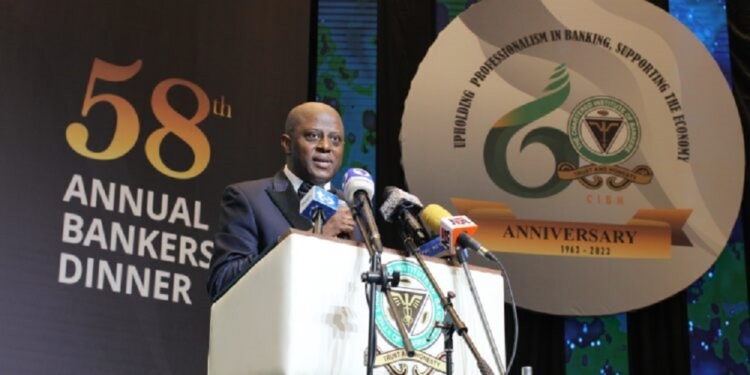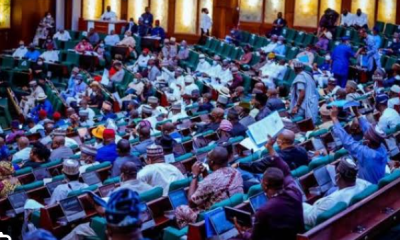Economy
Stop Interest Hiking, Experts Tell CBN As Apex Bank Raises Rate Again

Experts have called on the Central Bank of Nigeria (CBN) to halt its consistent interest rate hikes, citing the adverse effects on small businesses and household finances. The call follows the apex bank’s decision to increase the Monetary Policy Rate (MPR) by 25 basis points, raising it from 27.25% to 27.50%.
The decision, announced by CBN Governor Yemi Cardoso after the Monetary Policy Committee (MPC) meeting in Abuja, was aimed at tackling rising inflation. The MPC unanimously agreed to the hike, emphasizing its necessity to curb inflationary pressures.
Governor Cardoso also highlighted concerns over inflation driven by surging food and energy costs, stating that price stability remains a top priority. “The full deregulation of the downstream petroleum sector is expected to stabilize price levels in the medium term,” he added.
Financial analysts expressed mixed reactions to the move. Professor Uche Uwaleke, Nigeria’s first Professor of Capital Market, suggested the marginal increase could indicate a pause in aggressive rate hikes by early next year. “A halt is necessary to alleviate the rising cost of funds and improve credit access for small businesses,” Uwaleke explained.
On the other hand, Olatunde Amolegbe, Managing Director of Arthur Steven Asset Management, acknowledged the hike as expected but warned it could further strain businesses and households. “Higher financing costs will be passed to consumers, escalating prices of goods and services,” he noted.
David Adonri, Managing Director of Highcap Securities Limited, underscored the importance of monetary policy in managing inflation but stressed its limitations without complementary fiscal measures. He attributed rising inflation to expansionary fiscal policies, insecurity, and currency depreciation.
Despite the CBN’s measures, inflation remains stubbornly high, exacerbating economic instability. Analysts linked poor Q3 2024 GDP performance in agriculture and manufacturing to rising interest and exchange rates.
Adonri emphasized that unchecked inflation would harm both consumers and producers, urging fiscal and monetary authorities to collaborate on structural reforms. “Interest rate hikes offer short-term benefits, such as exchange rate stability, but addressing structural issues is vital for long-term growth,” he said.
Cardoso expressed satisfaction with the banking sector’s stability amid external and internal challenges. He noted that key financial indicators, including the Capital Adequacy Ratio (CAR) and Non-Performing Loan (NPL) ratio, remained robust.
Experts and the CBN alike stressed the need for coordination between monetary and fiscal policies to address the structural causes of inflation and stabilize the economy. Governor Cardoso reaffirmed the importance of collaboration, especially in managing exchange rate pressures and inflation fueled by high demand and energy costs.
Economy
CBN launches new platform, targets $1bn monthly diaspora remittances

The Central Bank of Nigeria, in collaboration with the Nigeria Inter-Bank Settlement System, has launched the Non-Resident Bank Verification Number platform, an initiative aimed at enhancing financial access for Nigerians in the diaspora.
The platform, which enables Nigerians abroad to obtain their Bank Verification Number remotely, removes the need for physical presence in Nigeria.
Speaking at the event in Abuja on Tuesday, CBN Governor, Mr. Olayemi Cardoso, described the platform as a key milestone in the country’s financial inclusion journey.
He noted that the NRBVN would ease the long-standing challenges faced by Nigerians in the diaspora who previously had to be physically present in Nigeria for BVN registration.
“For too long, many Nigerians abroad have faced difficulties accessing financial services at home due to physical verification requirements,” Cardoso said. “The NRBVN changes that. Through secure digital verification and robust Know Your Customer processes, Nigerians worldwide will now be able to access financial services more easily and affordably.”
The governor added that the NRBVN was not just a solution for financial access, but a step towards a more inclusive, innovative, and prosperous financial ecosystem.
“We are building a secure, efficient, and inclusive financial ecosystem for Nigerians globally,” he remarked. “This platform is not just about financial access, it’s about national inclusion, innovation, and shared prosperity.”
Cardoso also highlighted the growth in remittance flows, which increased from $3.3bn in 2023 to $4.73bn in 2024. He attributed this rise to recent reforms, including the introduction of the willing buyer, willing seller FX regime.
With the launch of the NRBVN, the CBN is targeting $1bn in monthly remittances.
“With the introduction of NRBVN and complementary policy measures, we are optimistic about achieving our ambitious target of $1bn in monthly remittance flows, a goal we believe is entirely achievable given the growing trust and convenience in formal remittance channels,” Cardoso said.
The event also featured a presentation by the Managing Director/CEO of NIBSS, Mr Premier Oiwoh, who detailed the technical and operational aspects of the NRBVN platform.
Oiwoh emphasised that the platform adheres to global standards, incorporating stringent Anti-Money Laundering and KYC compliance protocols to ensure transparency and security.
The Deputy Governor, Economic Policy, CBN, Mr Muhammad Abdullahi, also addressed the gathering, describing the NRBVN as a transformative tool for enhancing the banking experience for Nigeria’s diaspora.
He urged stakeholders to collaborate in refining the platform to meet the evolving needs of the diaspora community.
He further emphasised that the initiative would strengthen economic ties between Nigeria and its global citizens, and ultimately drive sustainable economic growth.
“Together, we stand at the threshold of a new era, poised to deepen the trust, enhance remittance growth, and forge a stronger, more meaningful connection between Nigeria and its global citizens,” Abdullahi said.
The NRBVN platform is part of a broader framework that includes the Non-Resident Ordinary Account and Non-Resident Nigerian Investment Account, which provide Nigerians in the diaspora with access to savings, mortgages, insurance, pensions, and investment opportunities in Nigeria’s capital markets.
Under current regulations, diasporans will have the flexibility to repatriate the proceeds of their investments.
The launch of the NRBVN platform marks a crucial step in the CBN’s efforts to improve financial inclusion and harness the economic potential of Nigeria’s diaspora.
Economy
SEE Black Market Dollar (USD) To Naira (NGN) Exchange Rate Today 12th May 2025

Below is the black market exchange rate for the US Dollar to Naira as of Sunday, May 11, 2025. These are the rates at which you can exchange your dollars for naira.
Black Market Dollar to Naira Exchange Rate (Aboki FX)
According to sources at the Bureau De Change (BDC) in Lagos, the dollar was bought at ₦1625 and sold at ₦1630 on Sunday, May 11, 2025.
Important Notice:
The Central Bank of Nigeria (CBN) does not officially recognize the parallel market, also known as the black market. The CBN advises anyone seeking foreign exchange to do so through their commercial banks.
Dollar to Naira Exchange Rates Today
Market Type Buying Rate Selling Rate
Black Market (Aboki) ₦1625 ₦1630
CBN Official Rate ₦1608–₦1614 –
Please note: Exchange rates may differ depending on the vendor or location, and the rates presented here might vary slightly from the actual rate at the point of transaction.
Economy
Naira Gains Slightly Against Dollar On May 8, 2025

On Thursday, May 8, 2025, the naira is exchanging for ₦1,627 to 1 US dollar at the parallel market (black market) in Nigeria.
This reflects the current rate at which individuals are trading dollars for naira outside of official financial institutions.
This means that for every one dollar, you can get the equivalent in naira of ₦1,627 on May 8, 2025, showing a very slight improvement compared to the previous day, indicating a momentary easing of pressure on the naira against the dollar.
Thursday, May 8, 2025, records a marginal upward movement in the exchange rate, suggesting a bit of stability in the local currency for those transacting in foreign exchange.
The black market rate represents the value at which individuals can trade their dollars for naira outside official exchange channels, where the currency’s value is largely driven by supply and demand dynamics rather than government regulation.
Note that the Black Market Exchange rate is typically higher than the official exchange rate because it is not regulated by the government and reflects a more immediate, fluctuating market response.
Today’s exchange rate has slightly improved compared to yesterday, Wednesday, May 7, when the naira exchanged at ₦1,628 per dollar. (This means the naira gained a bit of value in the past 24 hours, possibly due to a brief easing in dollar demand or better forex inflow.)
The value of a country’s currency is determined by aggregate supply and demand, influenced by factors such as national interest rates, inflation, capital flow, and the overall money supply.
These forces, both internal and external, affect the strength of a nation’s currency and contribute to exchange rate fluctuations. The most common method to assess a currency’s value is through exchange rates. The two main exchange rate systems are the fixed rate and the floating rate systems, with the parallel market rate offering a real-time reflection of currency trends.
Investors and market participants closely monitor parallel market rates for a more immediate and practical reflection of currency trends, often making it a reliable indicator of short-term shifts in economic conditions.
-

 News18 hours ago
News18 hours agoJust in: Another major headache as 3 PDP senators defect to APC
-

 News19 hours ago
News19 hours agoCourt Jails Two Six Months for Naira Abuse in Lagos
-

 News20 hours ago
News20 hours agoUnion seals Lagos company over racial discrimination of workers
-

 News19 hours ago
News19 hours ago$1.43m scam: Ajudua on the run as Supreme Court orders his return to prison
-

 News20 hours ago
News20 hours agoCBN warns public against fraudsters claiming to act on its behalf
-

 News17 hours ago
News17 hours ago10 WAEC students still missing as Rivers women demand Sole Administrator’s intervention
-

 News17 hours ago
News17 hours agoReps reject bill on rotational presidency among six geopolitical zones
-

 News3 hours ago
News3 hours agoKano varsity shuts female hostel over immorality


















